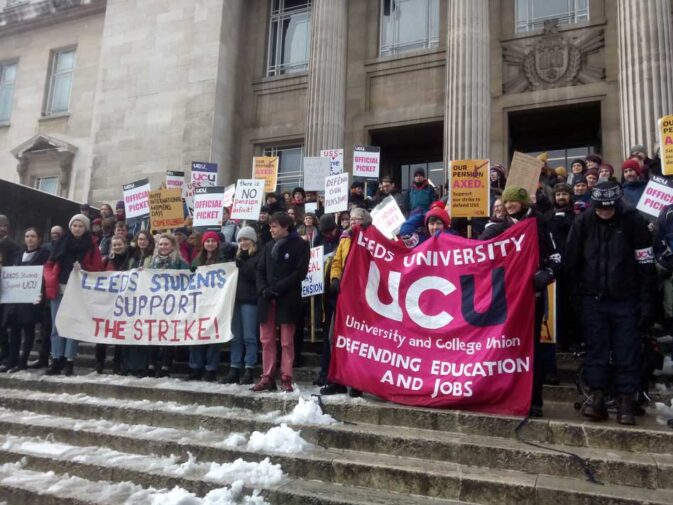

50,000 LECTURERS and higher education workers have started 14 days of strike action in a battle over pay, pensions and working conditions.
It follows on from an 8 day strike by 60 universities in November and December last year. Re-balloting of institutions where previous ballots did not meet the 50 per cent turnout threshold required by the Tory anti-union laws has increased the total number on strike to 74.
Four fights
The union is in dispute over two separate but related issues. The first is to defend the USS pension scheme. University bosses are trying to make workers pay more for less – despite the union agreeing to changes in 2011 that will leave the typical USS member around £240,000 worse off in retirement.
The second issue is a fight over pay, workload, equality and casualisation. Since 2009, real pay has fallen by 20 per cent, the gender and ethnic pay gap is increasing, and the proliferation of precarious contracts is putting intolerable pressure on staff.
The context for this assault is the marketisation of the higher education sector, turning education into a commodity in a marketplace of student ‘consumers’. This neoliberal project has been underway across Europe for decades, but accelerated in Britain under New Labour and the Coalition government, with the introduction of tuition fees forcing universities to compete for students.
The ballooning salaries of university managers, the proliferation of prestige building projects in order to attract prospective ‘customers’, are being paid for by scrapping ‘unprofitable’ courses, attacking employees pay and conditions, and failing to invest in teaching and research that students need.
Solidarity
This marketisation of higher education which treats students as cash cows to be milked by for-profit rip-off merchants from campus cafeterias to residential halls is a major factor in the widespread support for the strike among students.
University bosses are doing everything they can to undermine student-worker solidarity. It started with campaigns playing on students’ status as consumers, pointing out that support for the strike would cause students to miss contact time they were paying for.
But it rapidly escalated to punitive measures. Many university managements have threatened students with suspension or expulsion from their course if they refuse to cross picket lines. For international students on Tier 4 visas, being disciplined for supporting their lecturers carries the threat of forcible deportation.
Fat cat bosses are clearly happy to trouser £250,000+ a year salaries from student fees – but don’t want those ‘consumers’ to express an opinion on their own conditions of study. The basic solidarity of students who recognise that teaching conditions are learning conditions will be key to maintaining a united front against university management.
The exploitative and disciplinary character of higher education – upfront payments, crippling debt, and threat of sanctions – mean students need to organise together to fight alongside staff to defend higher education as a public service, accessible to all.
Unfortunately, the National Union of Students, which betrayed the fight against the trebling of tuition fees in 2011, is not an independent defender of students’ interests.
Students who want to show real solidarity with the UCU and their classmates should join the Student Left Network’s Student Strike Solidarity campaign.
Rank and file
Since 2018, the UCU has undergone a profound shift to the left; the impact of casualisation and extended strike campaigns have won the union thousands of new members.
Last year, the old leadership of the union was ousted, with independent left candidate Jo Grady elected as General Secretary.
This came in reaction to the previous leadership’s sell-out of the pensions strike in 2018 – despite a powerful grassroots opposition, which culminated in the bureaucracy closing down the union’s conference in an attempt to prevent criticism of former General Secretary Sally Hunt.
Despite the talk of a new rank and file direction for the union, the old bureaucracy which led the union since its inception 15 years ago remains largely unchanged and committed to the same methods which have seen lecturers trampled over by successive governments and their agents in the university senates.
With members determined to fight, and with strong support from students, there is a real opportunity to channel the anger into a strategy that can win.
The key task for rank and file UCU members is to take control of the dispute, by fighting to put the dispute under the control of a strike committee composed of recallable delegates from the branches.
The strike committee should democratically agree the objectives of the strike, its duration, and retain the right to decide if and when to call of the action.
Building a rank and file movement in the course of the action can be the first step to a wider transformation of the union into an instrument for struggle that can defend and fight for a positive vision of the whole post-16 education sector.